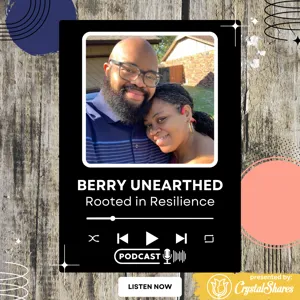Podcast Summary
Learning to Tolerate Discomfort vs. Managing Distress: Recognize discomfort vs. distress, practice mindfulness, set realistic goals, and seek support to mitigate distress and improve overall health.
Recognizing the difference between discomfort and distress is crucial for maintaining good physical and mental health. Discomfort can be tolerated and worked through, while distress, which is a heightened and prolonged state of discomfort, can have negative impacts on the body and lead to conditions such as high blood pressure, depression, and immune disorders. It's important to learn techniques to help mitigate distress and make our bodies more comfortable with being uncomfortable. In this episode of Life Kit, we discussed ways to do just that, including mindfulness practices, setting realistic goals, and seeking support from others. Remember, a little discomfort is normal and even beneficial, but if you find yourself in a persistent state of distress, it's important to reach out for help. Support for this podcast comes from our sponsors, including Whole Foods Market, Equinix, Apple Card, and Integrative Therapeutics. Whole Foods Market offers wallet-friendly finds for hosting a celebratory brunch, while Equinix enables businesses to bring their dreams to life. Apple Card rewards you daily cash on purchases, and Integrative Therapeutics provides clinician-curated supplements to help you unlock your best self.
Break the cycle of discomfort and give words to your feelings: To manage intense discomfort or feelings of overwhelm, try changing your environment, practicing deep breathing, or expressing your emotions through journaling, speaking out loud, or talking to a trusted friend or therapist.
When experiencing intense discomfort or feeling overwhelmed, it's essential to make a change to break the cycle. This could involve going outside, taking deep breaths, or even engaging with social media in a mindful way. The second takeaway is the importance of putting words to your feelings. By examining the story behind your emotions and giving them a name, you can help calm your nervous system and gain clarity. Whether through journaling, speaking out loud, or talking to a trusted friend or therapist, the key is to get the words out and make sense of the experience.
Identifying and acknowledging emotions: Recognizing feelings is important for personal growth. Use the feelings wheel to help identify emotions and validate them. Sit with discomfort to learn and grow.
Identifying and acknowledging our emotions is a crucial part of processing experiences and understanding ourselves. It's not just about recounting the facts, but also naming the feelings we had in response. This can be challenging, as it requires us to be honest with ourselves and accept that it's okay to feel certain ways. The feelings wheel is a helpful tool for identifying emotions and validating them. Additionally, practicing sitting in discomfort, rather than avoiding it, can help us grow and learn from new experiences. Discomfort is a normal part of life and can even be exciting, but if it becomes overwhelming and continues to grow without an end in sight, it can lead to distress. So, take the time to name your feelings, validate them, and learn to sit with discomfort as a way to grow and learn.
Recognizing the signs of distress and seeking help: When feeling tense, irritable, targeted, unsafe, and perceiving threats, it's crucial to recognize these signs as potential distress and seek help to prevent health issues like high cholesterol, high blood pressure, and poor sleep quality.
Our bodies have a limit to how much stress they can handle before they become dysregulated, leading to health issues like high cholesterol, high blood pressure, and poor sleep quality. It's essential to recognize when something is too much for us and may not be an area of growth but rather a source of distress. Signs of this include feeling tense, irritable, targeted, unsafe, and perceiving threats. When we're not feeling good, our body is trying to tell us something, and seeking medical help may be necessary. In the thick of it, finding ways to calm down, even if temporarily with medication, can help us process and eventually practice coping mechanisms. Remember, when we're too triggered, we can't do anything, and being uncomfortable is not the same as being in a state of distress or shut down.
Understanding discomfort and facing it head-on: To build resilience, notice patterns, practice coping mechanisms, and approach uncomfortable situations with confidence.
Building resilience to discomfort and uncertainty in life involves understanding ourselves and our triggers better. We all encounter uncomfortable situations daily, and our psyche may try to protect us by avoiding them. However, it's essential to face these situations and not keep them hidden for too long. To get more comfortable with being uncomfortable, start by noticing patterns and what makes you happy. For instance, if you have road rage, try exercising in the morning or changing what you listen to in the car. When approaching anxiety-inducing situations, wear something that makes you feel confident, arrive early, and communicate with loved ones about your needs. Remember, it's not about instantly fixing the issue but understanding it and gathering tools to cope.
Building resiliency and coping with discomfort: Recognize discomfort, talk to yourself, get info, practice mindfulness, and engage in self-care to build resiliency and navigate uncomfortable situations
When we're feeling uncomfortable or distressed, it's important to take action to make a change, name our feelings, and practice sitting in the discomfort. Dr. Kelly McGonigal, a psychologist, shares her insights on building resiliency and coping with discomfort. She emphasizes the importance of getting information about the situation, talking to ourselves, and recognizing physical sensations in our bodies. By acknowledging and accepting discomfort, we can learn to appreciate the ways we can get out of it and explain our experiences to ourselves and others. Practicing self-care activities like working out, getting enough sleep, and meditating can also help us prepare for uncomfortable situations and improve our overall well-being. In summary, by taking action, naming our feelings, and practicing mindfulness, we can build resiliency and learn to navigate uncomfortable situations with greater ease and understanding.
Exploring the Significance of Understanding Human Decisions and Self-Care: NPR sponsors Charles Schwab and Lisa promote the importance of understanding human decision-making through their podcasts, Choiceology and Lisa, respectively. These podcasts emphasize the significance of informed choices, self-care, and embracing the complexities of life.
Our daily lives are influenced by various factors, both significant and insignificant. NPR's sponsors, Charles Schwab and Lisa, highlight this idea in their respective podcasts. Choiceology, hosted by Katie Milkman, explores the psychology and economics behind people's decisions through stories from Nobel laureates, authors, athletes, and more. Meanwhile, Lisa's podcast promotes the importance of good sleep, offering a natural hybrid mattress made from natural materials and supporting charitable causes. On a lighter note, Wait Wait Don't Tell Me, another NPR podcast, demonstrates that even important figures like US Treasury Secretary Janet Yellen have quirks and interests outside of their professional roles. This reminder encourages us to appreciate the complexity of individuals and the various aspects of our lives. In summary, these NPR sponsors and their podcasts emphasize the significance of understanding the human mind, making informed decisions, and taking care of ourselves, all while acknowledging the importance of embracing the unexpected and unimportant aspects of life.






